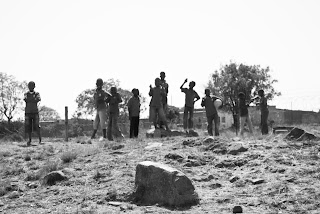I’m walking through the airport choking on salt. Then I’m running, skirt flies, flip-flops hit the tile and I never want to stop. If I sped past the gate, if I sped past the commitments... if I just kept going, turned left at denial and came back to the tiny bed, came back to my world...
The words aren’t coming easily now. On the plane all I wanted was a pen. Because the sun came up over the clouds and it was as if I had already left that world. We passed the Atlantic threshold and I was waking up on the other side. The American side. I found myself grappling with the moments that stood in my mind, the moments that had just happened before I took this seat. I willed the tears back so at least I could continue living them. But for the first time in 15 hours, they didn’t come as quickly.
Now, I’m waking up in the warm bed that’s like sleeping on a cloud. The space heater is on and the room feels like a sauna. I walk out in to the hall and look through the giant windows at the cold Missouri streets, at the cold sun that hangs in the clear sky, at the matching houses that line the block… I turn back to the bed, hide my face in the covers and let the sobs come out.
In my mind I picture I am holding on to a diamond. This diamond of experience, this precious rock that I’m squeezing so hard-- praying that it’s not going to deteriorate before my eyes.
My phone has text messages from people, but part of me is terrified to respond. I’m terrified to take a step back in to this world because of what it might do to my diamond. How is it going to change as I recollect it as experience? How is it going to change when I realize it is no longer my life, but just a chapter that can be paged through?
How are the people who have shaped my life there going to change in my mind when I try to translate them in to what can be understood here?
Perhaps it will make it easier, or perhaps I will just be more frustrated that no matter what words I use, pictures I show, videos I watch these are only a fraction of what has transpired these last five months. I will never be able to grasp all of it because the pieces only truly form the whole when you are in it. And I will never be in it again.
There are so many moments that I never want to forget. When I said goodbye to him in my room, sobbed in his shirt and asked how do you do this? I keep asking everyone, asking God, how do you do this? How do you keep everything that you have become, everything that you have seen, all the people that you have met—how do you hold them honestly when they are reshaping themselves and molding in to memories?
Because that is the hardest part: “The pain is the breaking of the shell that encloses your understanding” the shell of my understanding is breaking, it has cracked and I’m running around desperately trying to figure out which pieces go where. I sigh, collapse on the floor and realize that it is hopeless. “Even as the stone of the fruit must break so that it may stand in the sun, you must know pain.”






